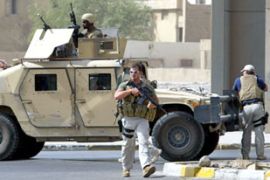Blackwater court battle looms
Private security guards accused of Iraq shooting set to surrender to US authorities.

Any dispute over where the trial should be held would delay proceedings and further frustrate the relatives of the Iraqis killed in Baghdad’s al-Nisoor Square in September 2007.
‘Fair judgment’
Mohammed Al-Kinani, whose son was killed in the shooting, said: “We hope to see a fair judgment that will impose the maxium penalty for them, not only the guards but the director who gave them the authority, weapons, vehicles and immunity.”
But Dr Haythem Al-Rubaie, who lost his wife and son in the al-Nisoor Square shootings, said there was “no credibility” in the US judiciary.
| IN VIDEO |
|
|
“But let me be optimistic and I hope that the judge will be a fair one since there are many innocent people who were killed in the attack and there should be a fair judge who will not respond to pressures.
“We hope that his word is a fair word, the result will show us credibility,” he said.
The five men’s identities and the nature of the charges against them had been kept secret for more than a year, but were also released on Sunday.
They were named as Evan Liberty and Donald Ball, both 26-year-old former marines, Dustin Heard, a 27-year-old ex-marine, Nick Slatten, 25, an ex-army sergeant, and Paul Slough, a 29-year-old army veteran.
The men are all decorated war veterans who were contracted to protect US diplomats in Iraq.
A sixth guard, who has not been named, has reached a plea bargain deal with prosecutors to avoid a mandatory 30-year prison sentence.
‘Unjustified deaths’
Blackwater said that the guards were returning fire after their convoy was shot at in Baghdad’s al-Nisoor Square.
|
“We hope to see a fair judgment that will impose the maxium penalty for them, not only the guards but the director who gave them the authority, weapons, vehicles and immunity” Mohammed Al-Kinani, father of victim |
The head of Blackwater appeared before the US Congress shortly after the incident, saying that the men acted responsibly.
However, FBI investigators found in late 2007 that most of the 17 deaths had been unjustified.
Steven McCool, a lawyer for Ball, confirmed that his client would surrender in his home state of Utah.
“Donald Ball committed no crime,” McCool said. “We are confident that any jury will see this for what it is: a politically motivated prosecution to appease the Iraqi government.”
The incident created a furore about the perceived ability of private guards to act with impunity in Iraq.
An Iraqi government spokesman has said that they believed that the attack were tantamount to deliberate murder.
Ali Al-Dabbagh, a spokesman for the Iraqi government, told Al Jazeera that Baghdad would maintain the victims’ right to a fair trial and would not accept anything less than “normal standards available in such cases”.
The case has also been complicated because, at the time of the attack, private contractors like Blackwater operated without any clear legal oversight and it could be argued they did not have to answer either to Iraqi or US laws.
Under the deal Blackwater had with the US government, it was allowed to repair the vehicles involved in the attack before investigators saw them, taking away key forensic evidence.
